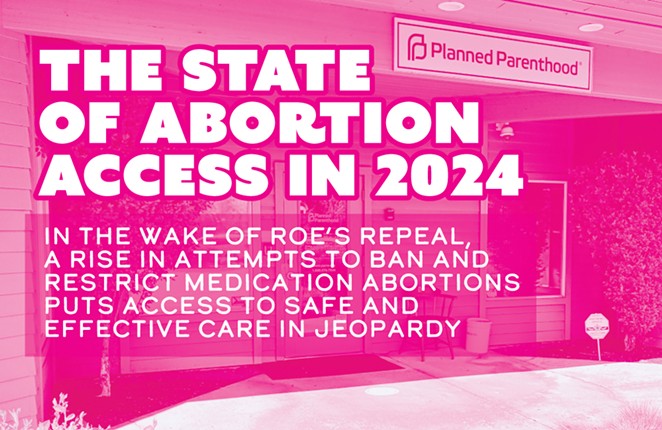On January 22, 1973, the U.S. Supreme Court gave individuals the federal constitutional right to abortion in the groundbreaking court case, Roe v Wade. The decision was then reversed when the U.S. Supreme Court overturned Roe v Wade with the June 2022 Dobbs v Jackson Women's Health Organization case, paving the way for states to restrict or ban abortions.
As of January, 21 states either completely ban abortions or restrict the procedure earlier in pregnancy than the previous standard set by Roe V. Wade, which held that a person may choose to have an abortion until a fetus becomes viable, between 24 and 28 weeks after conception.
Oregon is one of the few states with state law protecting abortion through pregnancy, with no gestational limit. However, the decision to overturn Roe v. Wade has compelled several states and lawmakers to further attempt to restrict the access to care.
With the inability to access care in several states, women seeking an abortion in areas with bans or high restrictions are now forced to take alternative methods. Women seeking procedural or "surgical" abortion care must travel to a state where the procedure is legal.
According to Jessica Keersemaker, Planned Parenthood Columbia Willamette's vice president of Patient Services, this can be complicated for many individuals.
"Now, many people must travel out of state to receive an abortion, which means they have to take time off work, arrange for travel, lodging, and often time need additional funding to help offset these costs," said Keersemaker.
PPCW has three Abortion Patient Navigators to help traverse all these additional steps and funding opportunities for people traveling from out of state to get an abortion.
For individuals seeking a medication abortion, the process is much smoother. Women in many states can access abortion pills online, by attending telehealth appointments and getting the pills shipped through the mail.
But new bans and attempted restrictions on Mifepristone, a drug that blocks the hormone progesterone, needed for a pregnancy to continue, may threaten access to medication abortion. According to the Guttmacher Institute, medication abortions accounted for more than half of all U.S. abortions in 2022.
Medication Abortion in Oregon
According to Keersemaker, medication abortion accounts for over 70% of the total abortions provided in Oregon.
Mifepristone, combined with Misoprostol, is the most effective way to end an early pregnancy, said Keersemaker. "That is why it has been the most commonly used regimen in the U.S. and regimen recommended by the American College of OB/GYN and the World Health Organization."
Medication abortions allow better access for women in rural areas, or women in states that have bans or stricter restrictions. "Restricting medication abortion would be yet another attack on personal freedom and bodily autonomy," said Keersemaker.
The Pew Research Center reported in April 2023 that a majority of adults, 53%, say that medication abortion should be legal in their state, 22% of adults say it should be illegal and 24% said they weren't sure.
A new study published in "Nature Medicine" found that abortion pills prescribed through telemedicine and received by mail are as safe and effective as obtaining pills by visiting a doctor. The study looked at the experience of over 6,000 patients in the months after the federal government began allowing abortion pills to be mailed, from April 2021 to January 2022.
The method was about 98% effective and was safe for over 99% of patients, the study reported. Additionally the Food and Drug Administration approved the use of Mifepristone, citing evidence that the pills are safe.
Attempts to Restrict Access
Several lawsuits and discussions are happening around outlawing access to abortion pills and services that allow women to have safe abortion care. In 2022, a coalition of anti-abortion groups, the Alliance of Hippocratic Medicine, filed a lawsuit against the FDA, seeking to overturn the approval of Mifepristone.
While a decision has yet to be made, the U.S. District Judge Matthew Kacsmaryk in Amarillo, Texas, ruled in January that three Republican-led states can join the lawsuit, complicating the case.
A Feb. 17 article from The New York Times reported that allies and officials who served in former President Donald Trump's administration are discussing plans to further restrict abortion rights if he returns to power. Some of the proposals, according to the article, include enforcing the Comstock Act, criminalizing the shipping of any material used in an abortion.
Another current attempt at restricting access is the consideration of reinstating requirements initially made by the FDA when it approved Mifepristone in 2000, requiring providers to see patients three times and prescribe the abortion drug in person. The FDA rescinded this requirement in 2021. The Supreme Court will hear oral arguments for the case on March 26.
According to Keersemaker at Planned Parenthood, if the Supreme Court upholds these restrictions for medication abortions, it will harm the communities that face the greatest barriers to care.
"Requiring patients nationwide to see a provider three times is an unnecessary, cruel barrier to receiving essential health care, especially for patients who travel long distances, or from out of state to get an abortion and, it could potentially affect the 11-week gestational age removing medication abortion as an option," Keersemaker said.
A Continued Effort to Keep and Restore Rights
A statement from President Joe Biden on Jan. 22, the 51st anniversary of Roe v Wade, showed the administration's view on the current state of abortion access.
"On this day and every day, Vice President Harris and I are fighting to protect women's reproductive freedom against Republicans officials' dangerous, extreme and out-of-touch agenda," read the statement. "We stand with the vast majority of Americans who support a woman's right to choose, and continue to call on Congress to restore the protections of Roe in federal law once and for all."
In the case that federal restrictions on Mifepristone are put in place, PPCW said it has extensive experience with safe alternatives, like misoprostol-only medication regimens for abortion and miscarriage.
"We have been proactively preparing in case the outcome in this case is unfavorable," said Keersemaker. "We have protocols ready to use to move to a Misoprostol-only regimen for our patients and we have procedural or surgical abortion care available."
According to Keersemaker, Oregon leads the nation with the strongest protection for abortion care. It has no legislative restrictions on abortion and has both private and public insurance coverage for abortion care.
Since the 2022 Dobbs decision, Keersemaker said, PPCW has provided care to patients from about 40 states who travel to its health centers in Oregon and southwest Washington. All eight PPCW health centers offer medication abortion up to 11 weeks gestation. However, other local health care providers that could offer these services in Central Oregon do not. St. Charles Health System, for example, does not offer abortion services, according to its website.
"It is crucial that Central Oregonians know that they can safely and legally access medication abortion — the most effective way to end an early pregnancy — in person or via telehealth at Planned Parenthood," said Keersemaker.























